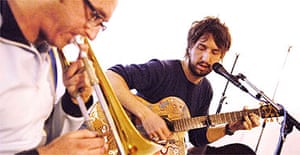INTERVIEW : 2005-12-09 We're jammin': Joseph Arthur 'New Orleans was great. It was accidental Buddhism' (by Pascal Wyse)
Listen to Pascal and Joseph Arthur (MP3)

'I'm getting more and more into that space thing.' Pascal and Joseph do their thing.
Photograph: Sarah Lee
---
It sounds as if Joseph Arthur had to go to a fairly dark place to make his latest album, Our Shadows Will Remain. Having been "discovered" and signed by Peter Gabriel in 1997, made three albums and toured successfully, he found, five or six years later, that he was strangely alone.
"It was weird. I had had a manager for a long time and we parted ways. I didn't have a record deal - and I didn't even know if I was going to get a deal again. I was pretty fed up with the whole machinery of the music industry."
He had planned to leave New York and buy a house in New Orleans. However, with security and income both at a low, Arthur decided it was too risky. "But I had already liked the idea of getting out of New York, so I just went. I put all my possessions in storage, and left with the bare essentials: suitcase, guitar."
The ambiguity of the album title - are the shadows demons or a positive legacy? - reflects the fact that harsh necessity became the mother of invention, and Arthur returned from New Orleans with an acclaimed new album. "It was great. It was accidental Buddhism."
He looks like that wandering musician when we meet - a bag, a hand-painted acoustic guitar and some cigarettes. And the accidental Buddhist is still there too: everything he plays and sings burns slowly and thoughtfully. On Our Shadows, Arthur layers his voice and guitar into a wholesome, gritted sound; he manages the same thing when playing solo with the help of pedals. It's a luxurious orchestra, but, like a brooding Barry Adamson, it doesn't always comfort.
"That is totally disgusting," says Arthur, laughing as I release spit from the valve at the end of the trombone. If you don't let it out, the instrument starts to bubble like a coffee machine. Playing along to Arthur's songs, we put the trombone through electronic pedals too - to make it more sinewy and distant. It seems to sound better snaking through the spaces in the music.
"I'm getting more and more into that space thing. When I was young I was really into Miles Davis's Bitches Brew, Jaco Pastorius, Weather Report. I played bass, so I wanted to be a sort of fusion bassist. When I got older I played in rock bands and, by default, was the singer too. Then I started thinking about lyrics, getting into Neil Young and Bob Dylan.
"I dropped the bass and got an acoustic guitar. I realised then what I could do if I wasn't concentrating on playing complicated bass lines - the more rich the melody and the lyrical content could be. There was a blanker canvas to paint on."
Paint and canvas are more than analogies for Arthur, whose Grammy nomination in 1999 was not for his CD, but for his artwork on it. More recently he has begun painting during performances.
"When I got ready to tour Our Shadows I was in this phase of being really into painting. I didn't want to leave it behind. So I was looking around and thought, I'll take a couple of these canvases for cheap stage design.
"Then I thought, why not take a blank canvas and, during sound check or whatever, draw a picture and take that canvas and finish it at the next place. That graduated to doing a painting every night while singing in front of people.
"It really helped the painting. When your conscious brain is focusing on singing, your unconscious is freer to express itself organically. You can see the difference from the more self-conscious work. It's an energy you can't get in your apartment. I read an interview with Chuck Close, where he said that painting was a performance - it just happens to be one that people see later."
Suddenly Arthur asks me if I know Silent Night; the Radio 5 show he is recording later wants him to sing a carol. It feels like a pretty unlikely scenario for the underworld of his sound, but it works. We feel our way through the tune - a dark and silent night.
"New Orleans is such an interesting city - or was such an interesting city," says Arthur. "There's a dark, invisible energy. It's a strange place. And there are musicians all over the place. During the afternoon you can go to a bar and there are guys making music that, if you were in New York, it would cost you 20 bucks to go to see - random geniuses playing in the corner. "
But doesn't that make you think, why bother? "No, it's not depressing. Because it's a world unto itself. It has its own dimension. So it's not like you're measuring it up against anything. You leave a city like New York and your ideas of success totally change. That's the point."
· Our Shadows Will Remain is out now. Joseph Arthur plays Shepherd's Bush Empire on February 24
Comments
Post a Comment